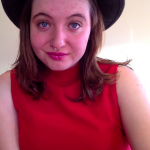COLLEGE FEMINISMS: A History of Lipstick
By Zoe Handler
I fall in love for the first time. My partner sighs when my kisses leave faint red lipstick marks on their forehead and their white shirts. Each time I’m apologetic but I like the idea that someone will have to wash away evidence of me and it still might not fade out clean, like scraped knees that leave behind faint scars.
In 1700s England cosmetics are reserved only for sex workers, red lips, and flushed cheeks are the essence of erotic. I wear red lipstick and thick coats of mascara to my high school prom. It has been almost half a year since I menstruated and I have shrunk into my bones. My body is thin and frail like newly sprouted roots that will tear from the ground with the slightest pull. I’m afraid of how I look that night. My mother has to convince me that I don’t look like “too much.” At the end of the night I’m simultaneously embarrassed and relieved that no one sees my disabled body as sexual. A month later I will be lying in an I.C.U. bed begging my father for water.
I’m nineteen, sitting alone on the forty nine bus heading to downtown Seattle. A man approaches me and tells me, “Your lipstick is in your teeth. You look like a boxer after the fight.” He laughs and I say nothing. He asks me my name and I say nothing. He asks me if I have a boyfriend and I say nothing. He asks me for my phone number and I say nothing. My silence drives him away. He mutters “Bitch” as he rises to leave, his calloused hands curled into fist. For the first time in a long time I no longer feel afraid.
Queen Elizabeth popularized the look of pale skin and dark red lips during the sixteenth century. Lipstick was supposed to run death away. Sometimes I make a game of making myself look ghostly like this—like how all the brides in my family looked—to distract myself from the task of dying. I am startled when I see my reflection out of the corner of my eye because it reminds me of a white wolf after the kill.
On Yom Kippur my family fights as we barrel out the front door, my mother shouting at all of us that we’re going to be late. This will be the first time that my father has been to synagogue since his father’s death. Most years he laughs when my mother drives the long way, bypassing highways and thoroughfares. His tongue is stitched firmly inside his mouth. That year he fasts. That year he davens with the full force of his physical being. When the congregation begins to read the mourner’s kaddish, he clutches the fringe of his tallis deep into his palm. As I rise to pray, I wonder if it looks as though I have come into shul with everything to atone for. My lips are the color of a sacrifice.
Until the early 1900s, it was considered lewd to apply lipstick in public. The precision of carefully applying my lipstick gives me a feeling of control. The day I find out my uncle has taken a gun to his stomach I am 1,300 miles away from home. On my way home from visiting a friend, I buy myself a small black tube of Revlon’s “Ravish Me Red.” I forget my change on the counter and the clerk calls out after me as I exit the store, but I keep walking. Hands shaking, I apply it while looking in the side view mirror of a green pickup truck in the parking lot of the Walgreens. I am trying not to cry.
My mother tells me the lipstick imprint I leave on my cups of coffee reminds her of her mother growing up, getting ready to out for the night. I’ve seen the photos of my grandmother, her hair perfectly curled with a cigarette in one hand and a drink in the other. The clean lines on the porcelain begin to smear with each sip, leaving a blurred mess that reminds me of blood.
**************************
 Zoe Handler is an educator and writer who currently resides in their hometown of Denver, Colorado. As a queer disabled lefty ashkenazi Jewess, they are committed to creating social justice movements that center interdependency and radical accessibility. Previously they have worked as a peer-to-peer educator, shopgirl, disability commission president, and caretaker of indoor plants, cats, and babies.
Zoe Handler is an educator and writer who currently resides in their hometown of Denver, Colorado. As a queer disabled lefty ashkenazi Jewess, they are committed to creating social justice movements that center interdependency and radical accessibility. Previously they have worked as a peer-to-peer educator, shopgirl, disability commission president, and caretaker of indoor plants, cats, and babies.




0 comments